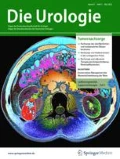Zusammenfassung
Uroonkologische Konzepte umfassen neben dem konkreten Behandlungsplan auch Therapieziele und Entscheidungsalgorithmen. Es wird diskutiert, ob letztere bei älteren geriatrischen Patienten genauso wie bei jüngeren Patienten gelten sollten oder ob eine Anpassung an Lebenssituation und veränderte Physiologie empfehlenswert ist.
Abstract
Uro-oncology is not only concerned with treatment methods themselves but also with therapeutic objectives and decision-making concepts involving algorithms. We discuss whether the latter is applicable to all patients groups or needs to be adapted in order to be suitable for elderly and frail patients with regard to their lifestyle and living situation as well as their altered physiology.


Literatur
McKibben MJ, Smith AB (2015) Evaluation and management of the geriatric urologic oncology patient. Curr Geriatr Rep 4:7–15
Robert Koch-Institut, Gesellschaft der epidemiologischen Krebsregister in Deutschland e. V. (Hrsg) (2017) Krebs in Deutschland für 2013/2014. 11. Ausgabe. RKI, Berlin
Mühlbauer V, Dallmeier D (2019) The pharmacological treatment of arterial hypertension in frail, older patients—a systematic review. Dtsch Arztebl Int 116:23–30
Borchelt M et al (2003) Abgrenzungskriterien der Geriatrie, Version V1.3. Basierend auf den Ergebnissen der Essener Konsensus-Konferenz vom 15.01.2003 in Essen und der Folgekonferenz vom 14.10.2003 in Hannover
Piccirillo JF et al (2008) The changing prevalence of comorbidity across the age spectrum. Crit Rev Oncol Hematol 67:124–132
Wedding U (2016) Geriatrisches Assessment in der Urologie. In: Michel MS et al (Hrsg) Die Urologie. Springer, Heidelberg, S 2273–2280
Droz JP et al (2017) Role of geriatric oncologists in optimizing care of urological oncology patients. Eur Urol Focus 3:385–394
Balducci L, Extermann M (2000) Management of cancer in the older person: a practical approach. Oncologist 5:224–237
S3-Leitlinie Diagnostik, Therapie und Nachsorge des Nierenzellkarzinoms Februar 2017 – Kurzversion, AWMF-Registriernummer: 043/017-OL
EAU Guidelines (2018) ISBN 978-94-92671-01-1
Bellmunt J et al (2009) The medical treatment of metastatic renal cell cancer in the elderly: position paper of a SIOG taskforce. Crit Rev Oncol Hematol 69:64–72
Quivy A et al (2013) Optimal management of renal cell carcinoma in the elderly: a review. Clin Interv Aging 8:433–442
Vogelzang NJ et al (2017) Clinical and economic outcomes in elderly advanced renal cell carcinoma patients starting pazopanib or sunitinib treatment: a retrospective medicare claims analysis. Adv Ther 34:2452–2465
Hutson TE et al (2013) Axitinib versus sorafenib as first-line therapy in patients with metastatic renal-cell carcinoma: a randomised open-label phase 3 trial. Lancet Oncol 14:1287–1294
van den Brom RRH (2016) Balancing treatment efficacy, toxicity and complication risk in elderly patients with metastatic renal cell carcinoma. Cancer Treat Rev 46:63–72
Leroy V et al (2019) Adverse events need for hospitalization and systemic immunosuppression in very elderly patients (over 80 years) treated with ipilimumab for metastatic melanoma. Cancer Immunol Immunother. https://doi.org/10.1007/s00262-019-02298-9
Interdisziplinäre Leitlinie der Qualität S3 zur Früherkennung, Diagnose und Therapie der verschiedenen Stadien des Prostatakarzinoms, Kurzversion 5.0 – April 2018, AWMF-Register-Nummer 043/022OL
Droz JP (2010) Management of prostate cancer in older men: recommendations of a working group of the International Society of Geriatric Oncology. BJU Int 106:462–469
Mulders PF et al (2014) Efficacy and safety of abiraterone acetate in an elderly patient subgroup (aged 75 and older) with metastatic castration-resistant prostate cancer after docetaxel-based chemotherapy. Eur Urol 65:875–883
Suzman DL, Eisenberger MA (2014) Determining the optimal treatment for metastatic castration-resistant prostate cancer: age should not be a factor. Eur Urol 65:884–886
Graff JN et al (2016) Efficacy and safety of enzalutamide in patients 75 years or older with chemotherapy-naive metastatic castration-resistant prostate cancer: results from PREVAIL. Ann Oncol 27:286–294
Sweeney CJ et al (2015) Chemohormonal therapy in metastatic hormone-sensitive prostate cancer. N Engl J Med 373:737–746
Maia MC (2018) Efficacy and safety of docetaxel in elderly patients with metastatic castration-resistant prostate cancer. J Glob Oncol 4:1–9
Heidenreich A et al (2014) Safety of cabazitaxel in senior adults with metastatic castration-resistant prostate cancer: results of the European compassionate-use programme. Eur J Cancer 50:1090–1099
Pepa DC et al (2017) Predictive Comprehensive Geriatric Assessment in elderly prostate cancer patients: the prospective observational scoop trial results. Anticancer Drugs 28:104–109
Aaldriks AA et al (2016) Prognostic factors for the feasibility of chemotherapy and the Geriatric Prognostic Index (GPI) as risk profile for mortality before chemotherapy in the elderly. Acta Oncol 55:15–23
Soubeyran P et al (2014) Screening for vulnerability in older cancer patients: the ONCODAGE Prospective Multicenter Cohort Study. PLoS ONE 9(12):e115060
Author information
Authors and Affiliations
Corresponding author
Ethics declarations
Interessenkonflikt
A. Manseck, S. Manseck und C. Körner geben an, dass kein Interessenkonflikt besteht.
Dieser Beitrag beinhaltet keine von den Autoren durchgeführten Studien an Menschen oder Tieren.
Rights and permissions
About this article
Cite this article
Manseck, A., Manseck, S. & Körner, C. Uroonkologische Konzepte im Alter. Urologe 58, 403–409 (2019). https://doi.org/10.1007/s00120-019-0892-7
Published:
Issue Date:
DOI: https://doi.org/10.1007/s00120-019-0892-7
Schlüsselwörter
- Geriatrisches Assessment
- „Activities of daily living“
- Nierenzellkarzinom
- Prostatakarzinom
- Urothelkarzinom

